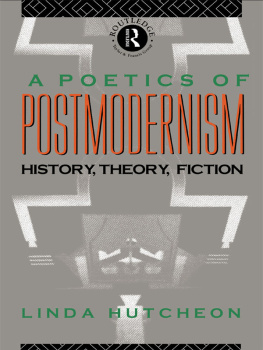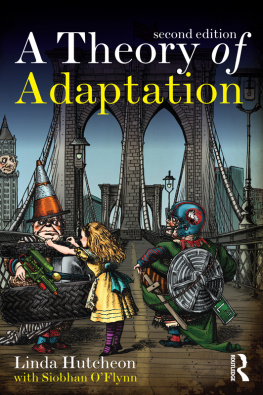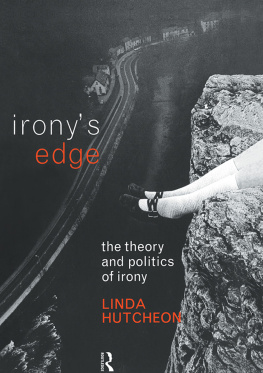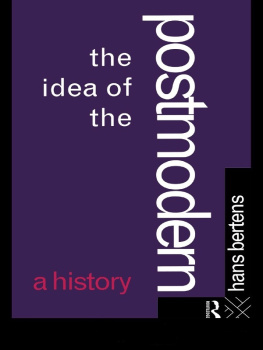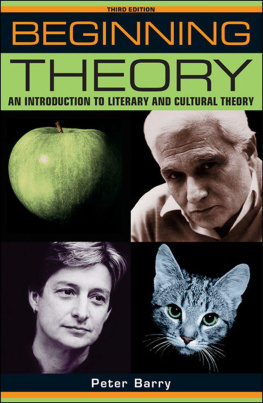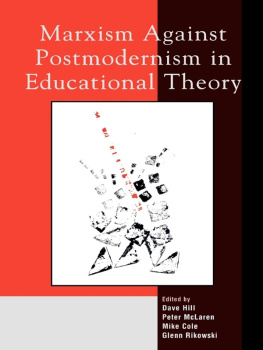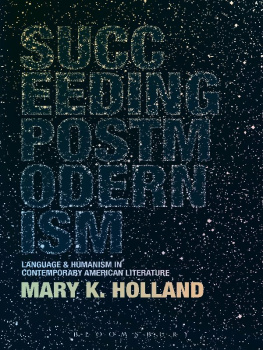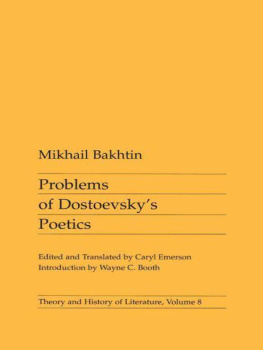Hutcheon Linda - A poetics of postmodernism: history, theory, fiction
Here you can read online Hutcheon Linda - A poetics of postmodernism: history, theory, fiction full text of the book (entire story) in english for free. Download pdf and epub, get meaning, cover and reviews about this ebook. City: New York, year: 2004;2011, publisher: Routledge, genre: Religion. Description of the work, (preface) as well as reviews are available. Best literature library LitArk.com created for fans of good reading and offers a wide selection of genres:
Romance novel
Science fiction
Adventure
Detective
Science
History
Home and family
Prose
Art
Politics
Computer
Non-fiction
Religion
Business
Children
Humor
Choose a favorite category and find really read worthwhile books. Enjoy immersion in the world of imagination, feel the emotions of the characters or learn something new for yourself, make an fascinating discovery.
- Book:A poetics of postmodernism: history, theory, fiction
- Author:
- Publisher:Routledge
- Genre:
- Year:2004;2011
- City:New York
- Rating:3 / 5
- Favourites:Add to favourites
- Your mark:
- 60
- 1
- 2
- 3
- 4
- 5
A poetics of postmodernism: history, theory, fiction: summary, description and annotation
We offer to read an annotation, description, summary or preface (depends on what the author of the book "A poetics of postmodernism: history, theory, fiction" wrote himself). If you haven't found the necessary information about the book — write in the comments, we will try to find it.
A poetics of postmodernism: history, theory, fiction — read online for free the complete book (whole text) full work
Below is the text of the book, divided by pages. System saving the place of the last page read, allows you to conveniently read the book "A poetics of postmodernism: history, theory, fiction" online for free, without having to search again every time where you left off. Put a bookmark, and you can go to the page where you finished reading at any time.
Font size:
Interval:
Bookmark:

First published 1988
by Routledge
11 New Fetter Lane, London EC4P 4EE
Simultaneously published in the USA and Canada
by Routledge
29 West 35th Street, New York, NY 10001
Transferred to Digital Printing 2003
Routledge is an imprint of the Taylor & Francis Group
This edition published in the Taylor & Francis e-Library, 2004.
1988 Linda Hutcheon
All rights reserved. No parts of this book may be reprinted or reproduced or utilized in any form or by any electronic, mechanical, or other means, now known or hereafter invented, including photocopying and recording, or in any information storage or retrieval system, without permission in writing from the publishers.
British Library Cataloguing in Publication Data
A catalogue record for this book is available from the British Library
Library of Congress Cataloguing in Publication Data
A catalogue record for this book is available from the Library of Congress
ISBN 0-203-35885-6 Master e-book ISBN
ISBN 0-203-37141-0 (Adobe eReader Format)
ISBN 0-415-00705-4 (hbk) ISBN 0-415-00706-2 (pbk)
No text is without its intertexts, we have been taught. This one is no exception. The finely honed readings of postmodern texts by two colleagues in particular deserve mention right at the start: those of Alison Lee and Janet Paterson. Not only have they offered worthy examples to follow but also both have been provocative critics of various parts of this book. So too has been Graham Knight, the most critical and acute reader one could ever wish for. For listening to or reading parts of this study, or for just tossing ideas around with me, I would particularly like to thank Catherine Belsey, Aruna Srivastava, Susan Bennett, Magdalene Redekop, and Pamela McCallum. I owe much as well to the members of three graduate classes at McMaster University and the University of Toronto, for they were the guinea pigs upon which these ideas were testedand the stimulus for their (sometimes total) rethinking.
Over the last few years, a number of university audiences have heard parts of the research that went into this study. I would like to thank those institutions for inviting me to speak and for giving me the chance to work out my ideas in a public forum: Columbia University, Queens University, University of Toronto, University of Calgary, University of Alberta, Catholic University of America, University of Saskatchewan, University of Ottawa, Concordia University, York University, McGill University, Universit de Montral, University of Western Ontario. Similarly I would like to thank the professional associations whose conferences also gave an occasion for trying out new ideas on new audiences: the Modern Language Association (and Northeastern MLA), Royal Society of Canada, Association of Canadian University Teachers of English, Association for Canadian and Quebec Literatures, Canadian Comparative Literature Association, American Comparative Literature Association, Canadian Philosophy Association (Society for Hermeneutics and Postmodern Thought), and the International Association for Philosophy and Literature.
Similarly parts of this book have appeared in shorter and earlier versions (often with quite different foci) in various journals (Textual Practice, Cultural Critique, Diacritics, Genre, English Studies in Canada) and in essay collections (Gender and Theory: A Dialogue between the Sexes [ed. L.Kauffman], Intertextuality and Contemporary American Fiction [ed. P.ODonnell and R.Con Davis], Future Indicative: Canadian Literature and Literary Theory [ed. J.Moss]). To the editors interest in and support of work in progress I am greatly indebted.
Perhaps the greatest intertextual framework of this study, though, is that of all the current debates on the nature and definition of the postmodern. Though this book would have been finished a lot earlier without them, I can only be grateful that I had such wonderful minds to think both with and against. My particular debts to each will be clear from references in the text, but I would like to single out the ones who most stimulated me and helped me formulate my own notions: Andreas Huyssen, Teresa de Lauretis, Arthur Kroker, Alan Wilde, Charles Russell, Charles Newman, Brian McHale, Fredric Jameson, Terry Eagleton, and especially those theoristpractitioners: Martha Rosler, Paolo Portoghesi, Charles Jencks, and Victor Burgin, to mention only a few.
Three particular thanks must end this list. One is to an institutionthe Canada Councilwhose Killam Research Fellowship gave me the time and the financial support needed to write this book. The second is to Methuen and especially to Janice Price, for having confidence in my work and being so supportive of it. And the last is, as always, to my spouse, Michael, for his constant encouragement, unfailing good humor, fine critical sense, and amazing patience in putting up with my postmodern obsessions.
Linda Hutcheon
Toronto 1987
What will no longer do is either to eulogize or to ridicule postmodernism en bloc. The postmodern must be salvaged from its champions and from its detractors. Andreas Huyssen
This study is neither a defense nor yet another denigration of the cultural enterprise we seem determined to call postmodernism. You will not find here any claims of radical revolutionary change or any apocalyptic wailing about the decline of the west under late capitalism. Rather than either eulogize or ridicule, what I have tried to do is study a current cultural phenomenon that exists, has attracted much public debate, and so deserves critical attention. Based on the notion that any theorizing must derive from that which it purports to study, my focus here is on those points of significant overlap of theory with aesthetic practice which might guide us to articulate what I want to call a poetics of postmodernism, a flexible conceptual structure which could at once constitute and contain postmodern culture and our discourses both about it and adjacent to it. The points of overlap that seem most evident to me are those of the paradoxes set up when modernist aesthetic autonomy and self-reflexivity come up against a counterforce in the form of a grounding in the historical, social, and political world. The model I have used is that of postmodern architecture, as theorized by Paolo Portoghesi and Charles Jencks and as actualized by Ricardo Bofill, Aldo Rossi, Robert Stern, Charles Moore, and others. By analogy, what would characterize postmodernism in fiction would be what I here call historiographic metafiction, those popular paradoxical works like Garca Mrquezs One Hundred Years of Solitude, Grasss The Tin Drum, Fowless A Maggot, Doctorows Loon Lake, Reeds The Terrible Twos, Kingstons The Woman Warrior, Findleys Famous Last Words, Rushdies Shame, and the list could go on. There are also parallel paradoxical manifestations of the postmodern in film, video, photography, painting, dance, music, and other literary genres, and these form part of the sample from which this poetics will be derived.
In Narcissistic Narrative, my interest had been in the metafictional paradox of self-conscious narratives which demanded of the reader both detachment and involvement. In A Theory of Parody, my interest shifted to the more general issue of the paradoxes of parodyas signaling ironic difference at the heart of similarity and as an authorized transgression of convention. Given this definition, parody appeared to require investigation by a doubled model that combined the semiotic (pragmatics) with the formally intertextual. But it was in moving to an even more general consideration of postmodern art (which is both intensively self-reflexive and parodic, yet it also attempts to root itself in that which both reflexivity and parody appear to short-circuit: the historical world) that I realized that the formalist and pragmatic approaches I had used in the other two studies would need expanding to include historical and ideological considerations demanded by these unresolved postmodern contradictions that worked to challenge our entire concept of both historical and literary knowledge, as well as our awareness of our ideological implication in our dominant culture. This is where my personal interests have coincided with what Frank Lentricchia has called a crisis in literary studies today, caught as it is between the urge to essentialize literature and its language into a unique, vast, closed textual preserve and the contrasting urge to make literature relevant by locating it in larger discursive contexts (1980, xiii). Postmodern art and theory both incarnate this very crisis, not by choosing sides, but by living out the contradiction of giving in to both urges.
Font size:
Interval:
Bookmark:
Similar books «A poetics of postmodernism: history, theory, fiction»
Look at similar books to A poetics of postmodernism: history, theory, fiction. We have selected literature similar in name and meaning in the hope of providing readers with more options to find new, interesting, not yet read works.
Discussion, reviews of the book A poetics of postmodernism: history, theory, fiction and just readers' own opinions. Leave your comments, write what you think about the work, its meaning or the main characters. Specify what exactly you liked and what you didn't like, and why you think so.

